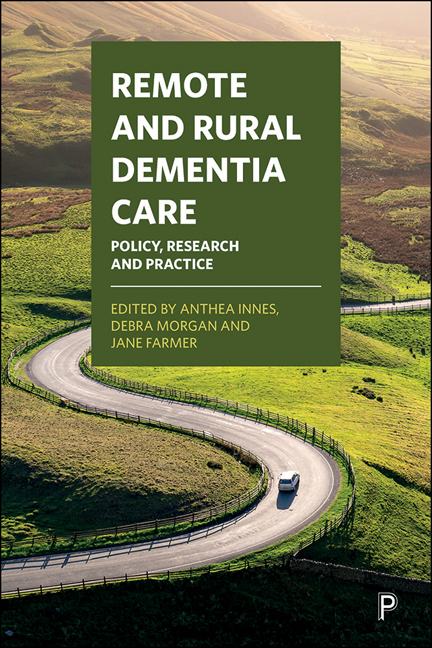2 - The Future of Dementia Care in Rural Areas of The World
Published online by Cambridge University Press: 10 March 2021
Summary
Introduction
The purpose of this chapter is to consider the issues experienced by people with dementia, their carers and families – and the issues of providing services for people with dementia – in rural areas around the world. The chapter endeavours to focus in particular on issues for low-and middle-income countries (LMICs), also sometimes referred to here as developing countries. The chapter seeks to highlight issues in rural experiences of dementia that policy makers in resource-depleted settings need to consider at national and regional levels. The chapter specifically acknowledges supra-national efforts to improve experiences of dementia and care, and to influence development of dementiaspecific policy, and considers the specific role of these efforts for rural places. This includes supra-national policy organisations – primarily the leadership of the World Health Organization (WHO) – and civil society and research organisations that advocate for people with dementia to have their voice heard and that drive knowledge and solutions about, for and with, people with dementia in LMIC settings.
While across the world ‘rural’ is differentiated from ‘urban’ by its distance from large centres of services and amenities coupled with sparse population distribution, rural places are highly diverse internationally and can be so even within one country setting. Thus, as discussed, ‘the nature, context and needs of rural communities and rural practice will differ around the world. Local solutions will require … local initiatives’ (WONCA, 2014: 1).
While rural places differ around the world, they tend to share some key features that are essential to understand and acknowledge when making and applying rural policy. In social terms, rural places tend to have cultural norms and values that, due to small populations repeatedly interacting, become strongly enforced and reinforced, making it hard to be different. Difference can be stigmatised and people strive to ‘fit in’, which drives attempts to be resilient and get through rather than to show weakness. Gender roles and power dynamics can be strongly enforced, with formal and informal leaders having significant power. Internationally, people in rural areas tend to experience higher levels of poverty, and lower levels of education and access to welfare compared with those in urban areas. Transportation and technology-related imbalances result in rural dwellers experiencing spatial social exclusion (Strasser et al, 2016; Salemink et al, 2017).
- Type
- Chapter
- Information
- Remote and Rural Dementia CarePolicy, Research and Practice, pp. 17 - 36Publisher: Bristol University PressPrint publication year: 2020



